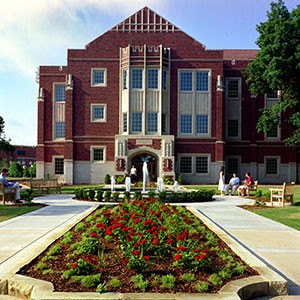They not only learned about innovation in the classroom, but the hands-on experience each student gained while working with the AT&T Foundry in Plano, TX, was something other college students can only imagine. Their final presentations to AT&T employees proved that not only did the MBA students embrace this experience but they also could assist AT&T with future possible endeavors.
The AT&T Foundry in Plano opened in 2011, along with other AT&T Foundry innovation center locations in Ra’anana, Israel and Palo Alto, Calif. These innovation centers help facilitate fast-paced collaboration with developers to deliver the latest technology to customers, and they offer developers a way to bring their innovation to market quickly. Each of the facilities is designed to be open, both from a physical standpoint, as well as a business process standpoint. There are no cubicles, the desks are on wheels to enable teams to form and reform as projects come and go, and whiteboards and open meetings areas encourage conversation and assistance among teams. From a business standpoint, the focus is on collaboration to enable rapid development. The AT&T Foundry works with third-party developers around the world to find the best technologies for the most pressing business and customer needs.
The Price students worked with AT&T Foundry employees to identify certain technologies and to present a detailed analysis of the innovation. The MBA students who participated, included Michael Hernandez, Bess Jackson, Greg Lankston, Zach Mauch, Hailey Sedwick, David Spielman and Joshua Woodbridge. They each felt this real-world experience would benefit them greatly in their future careers. David Spielman, who also will be interning as a Dunham Scholar at the AT&T Foundry in Israel this summer, believes that this exciting opportunity with AT&T is unique and inspiring. “The AT&T Foundry is a business unit unlike any other. Similarly, Israel is a nation with an entrepreneurial spirit unlike any other. Being able to see the combination of the two this summer will be an opportunity rife with learning experience!”
During the presentations, the MBA students focused on analysis, including cost models, viability, obstacles, audiences, future steps and recommendations, among other things. Jim Wheeler describes this experience as one that brought technology and innovation together. “Students not only learned the concepts of commercialization, but they also had to immerse themselves with the technology behind the AT&T Foundry project in order to determine ideal commercialization paths,” he says. “Learning a new technology at the same time as learning the commercialization process is challenging and the students did great!” AT&T concurred that the students exceeded their expectations and how useful the fresh viewpoints will be to their work.
At the end of the presentations, AT&T asked what students would change for future opportunities such as this. Some suggested starting closer to the beginning of the semester while others said more accessibility to AT&T Foundry staff, a mentor was even mentioned. All agreed the visits to the AT&T Foundry were very helpful with face-to-face meetings and how visits from them to campus may be in order in the future. Everyone at Price College involved with this project looks forward to this interaction in coming semesters and would like to thank the following AT&T staff for this incredible opportunity and interaction: Tracy Moonier, Mike Berry, Brian Wainstein, Joel Quejada and Krish Prabhu.



